PRESIDENT Goodluck Jonathan’s hostage negotiator, Dr Stephen Davis, has done Nigerians a great favour and put his employer in a tight corner. Davis has broken the official taboo against naming names of persons behind Boko Haram, those who fund the ceaseless bloodbaths, abduction of adolescent girls as sexual slaves, arson and more.

Dr Stephen Davis
We owe Davis a debt of gratitude for letting us know more than our government has been willing to disclose: the mere geographical location of the Chibok girls coupled with the rote assurance of their safety.
Davis spoke first to a television station in Australia and then to a Nigerian medium, Arise Television. On 29 August, ThisDay published Davis’s revelations under the headline “Australian Negotiator Names Ihejrika, Sheriff as Sponsors of Boko Haram.” Davis points with the certitude of a chief prosecution witness to two highly placed citizens: retired Lt-General Azubuike Ihejirika, former Chief of Army Staff and field commander of the offensive against Boko Haram, and Alhaji Modu Sheriff, former governor of Borno State where Shekau has his headquarters and has planted the first flag of his dreamed Caliphate.
The utter secrecy surrounding what the government is doing or not doing to free the Chibok girls or end the insurgency has led to the unfortunate impression that it is helpless and all we can do is wait for Abubakar Shekau to become human again, renounce violence and lay down his arms. Or wait for the United States to send us night vision goggles and remaindered equipment from its wars in Iraq and Afghanistan before a proper anti-terrorism war can begin.
The evidence against Azubuike appears thin, but Sheriff, Davis says, “has been funding Boko Haram’s terrorism for years.” Davis has also pointed to an unnamed third person in Abuja whose three nephews allegedly participated in the Nyanya-Abuja bombing that killed 77 people. In his interview with SaharaReporters, the New York-based online news platform, Davis gives further details concerning this man by claiming that he is a top official of the Central Bank and Boko Haram’s banker.
To my mind, other than the surprise mention of Ihejirika, the real news is the proof by inference Davis gives of the charge that the government may indeed have been playing politics with the terrorist insurgency that has laid waste to vast swathes of the North East, killed thousands and scarred millions.
This is not the first time Sheriff’s name would be linked to Boko Haram, but whereas we could only watch as the government camp and the opposition traded accusations of playing politics with the insurgency, Davis, in the final analysis, has now indicted the President. Mostly through his underlying tone of incredulity as to why Boko Haram’s sponsors have not been arrested, why the SSS “doesn’t seem inclined to interrogate” the three nephews of the Abuja man for “concrete evidence against their uncle in whose house they were living.”
The implications of his words must have been clear to Davis, hence, I suspect, his attempt to absolve his employer of blame. If Jonathan arrests prominent politicians who are likely to run against him in 2015, he would lay himself open to the charge of hounding the opposition to enhance his re-election. To deflect that charge, he says, there has to be “a very high threshold” of evidence sufficient to “keep the Western nations happy.”
This can’t be higher than the normal weight of evidence to sustain a criminal charge and it is obvious that Davis is convinced the threshold was reached a long time ago. According to ThisDay, Davis “was emphatic that the people he names are current sponsors of Boko Haram,” that he had information on “some of them about three years ago; one of them four years ago,” and that one even provided “money and . . . in one case . . . six (Toyota) Hilux vehicles used for suicide bombing.”
Yet, by the end of Davis’s testimony, the line between the bad opposition politicians and the good government is blurred. Sheriff, now the de facto poster-politician allegedly sponsoring Boko Haram, has decamped to the ruling Peoples Democratic Party “in the hope this will give him protection.” What other course of action does Jonathan have now than to order the immediate arrest of all the persons that his hostage negotiator claims are the chief sponsors of Boko Haram?
And to charge them to court forthwith? Unless, of course, his hostage negotiator is a rabble rouser, in which case we must wonder how and why he has worked for three successive presidents. It can’t be the case that the evidence that emboldens Davis to name names is unavailable to Jonathan and his security and intelligence heads.
Jonathan must know that failure to act would give credence to the opposition’s counter-claim: a conviction that the insurgency was fomented by his political enemies to make the country ungovernable and prevent his re-election, but that the plot boomeranged and so it is best left unaddressed in order to gain him sympathy votes. My hunch is that Davis, an independent contractor, spoke at the bidding of the President, but even if he acted independently in order to force Jonathan’s hand, that should not prevent decisive action against any suspected Boko Haram sponsor, irrespective of party affiliation or status, against whom prima facie evidence can be adduced. All that is needed is political will.







